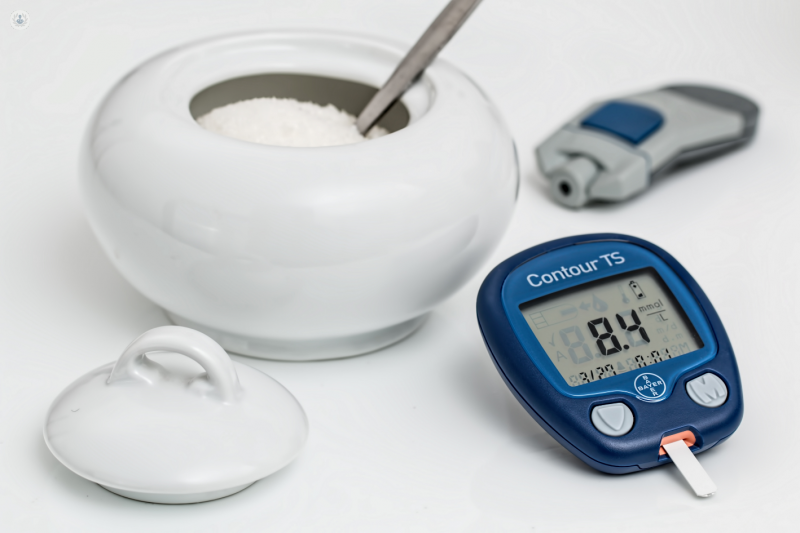Six principles of managing type 1 diabetes (part 2/2)
Written by:In part one of this article, I explained that while the theory of treating type 1 diabetes is relatively simple, putting it into practice is very complex. That is why I have published a book to help people with type 1 diabetes put the theory into practice.
My book, Take Control of Type 1 Diabetes, aims to provide you with all the information you need to ensure you are in the driving seat of managing your diabetes, rather than it managing you. In the book, I introduce six principles, that underpin successful management of type 1 diabetes.
In part one, we looked at the first three principles, ‘think like a pancreas’, ‘aim for normal glucose levels’ and ‘four is the floor’. These emphasise the need for regularly reviewing your insulin doses using frequent blood glucose monitoring and the critical importance of avoiding hypos. In part two, I will discuss the final three principles.
4
Low carbohydrate foods make it easier to achieve normal glucose levels

The aim of treatment is to keep glucose levels as normal as possible. As almost every meal will lead to an increase in glucose levels, then it makes sense to try and make life a bit easier for you (and for your insulin) by avoiding consuming large quantities of carbohydrates – the vast majority of which are turned into glucose by the body’s digestive system.
Although modern insulins are very good, even ‘rapid-acting’ insulins do not work as quickly or as effectively as naturally-produced insulin. There was a vogue about fifteen years ago to think that a person with type 1 diabetes could eat anything they wanted, as long as they took the correct insulin dose. The years of experience since then have convinced me that this is just not true.
I therefore recommend that you recognise the limitations of injected insulin: even a large dose simply cannot keep up with very large amounts of carbohydrate. It also risks bringing the glucose level too low and causing hypoglycaemia.
The traditional diet recommended for those with diabetes (and everyone else for that matter) is one that is based on starchy foods. As all starch is turned by the body into glucose, that advice has never seemed very logical to me for the treatment of diabetes.
Friends of mine with type 1 diabetes tell me they restrict their carbohydrates if they want to achieve the best control they can and I firmly believe that the standard advice is potentially detrimental to people with any type of diabetes. I cannot think of a single other condition, which is exacerbated by a certain type of food, where the recommended diet is to base all meals on exactly the foods that exacerbate it.
So my very basic diet plan, which I discuss in much more detail in the book, is to avoid sugar as much as possible and to try and aim to have no more than no more than 25–30g of carbohydrate with each meal.
Read more: the best diets for diabetes
5
Just about everything you do affects blood glucose levels

I have heard it said so often that a person with type 1 diabetes can do anything, it just requires a bit of adjustment. While the first part is undoubtedly true, the second is in my opinion a massive understatement. The reason is that, if you have type 1 diabetes, just about everything you do affects your blood glucose levels.
There are the obvious things like eating – most foods will have some effect on increasing blood glucose levels; alcohol – which can decrease or increase glucose levels depending on the relative content of alcohol and carbohydrate; and exercise – which will often reduce, but can also increase the blood glucose level.
Then there are the less obvious, like routine physical activity, such as housework, shopping, walking the dog or sexual intercourse, all of which can cause the blood glucose level to drop, sometimes quite sharply. Or stress, which often causes an increase in the glucose level, but sometimes can cause a decrease. Illness can cause quite a significant increase in glucose levels, even with a minor illness such as a cold.
And if that isn’t enough, women have the added issue of the menstrual cycle, which in some people can be associated with very troublesome fluctuations in glucose level, as a result of the impact of changing hormone levels. And there are probably many more that I am not even aware of.
In writing this, my aim is not to overwhelm you with thinking that achieving stable glucose control is an impossible task, because it isn’t.
But it does require a lot of learning basic information about how insulin works, about how your body responds to different foods and different situations, and about what you can do to ensure you have good glucose control as much of the time as possible.
6
Education is essential

As a person with type 1 diabetes, you have to live with the condition for 8,760 hours every year (8,784 in leap years). You will probably spend less than two hours a year with a health professional to discuss diabetes. That leaves 8,758 hours (or 99.9 per cent of the time) when you have to manage the diabetes yourself.
And as I have illustrated, unlike other hormone problems, it is not just a question of taking a tablet or an injection every day, it requires a more detailed level of understanding of the principles of diabetes management than most doctors and nurses have. It also requires the ability to solve problems independently, as for most of the time, you will know far more about your diabetes than anyone else you are in contact with.
I have had the privilege of helping many thousands of people manage their type 1 diabetes over the past 25 years. Some of my earliest experiences had a big impact on me, as they revealed just how unprepared I was to provide meaningful advice.
Early in my career, I recall a man who was in his late twenties. He was married with young children and worked in a factory. His life was overwhelmed by glucose levels that fluctuated wildly, from very low to very high levels, and he was at a complete loss as to how to escape this vicious cycle that was completely dominating his existence and impacting on his family life and his work.
The tragedy is that I and the other members of the team were pretty clueless about what to do as well, as in the early 1990s there was very little training in the UK of either health professionals or people with diabetes on the practicalities of managing type 1 diabetes.
Those early experiences led me to realise that not only did I need to up my game in diabetes management, but all health professionals needed to ensure that people with type 1 diabetes and their carers were provided with education so that they had the knowledge and the skills necessary to manage the condition. It led me some years later, to develop what I call an ‘Educational Model of Care’, which simply means that education of the person with diabetes on how to manage their condition has to be at the foremost of everything we do.
This emphasis on education led first to the development of the BERTIE course in Bournemouth 1999. BERTIE is a course that consists of four day-long sessions at weekly intervals, to train people with type 1 diabetes in key self-management skills, with a focus on carbohydrate counting and insulin dose adjustment.
Courses based on BERTIE are available in many diabetes centres across the UK. If you are unable to access a course, in 2005 I developed an online carbohydrate counting course (recently updated as freely available at www.BERTIEonline.org.uk).
And now there is also my book, which aims to provide you with all the information needed to make a success of managing type 1 diabetes. Of course, a book cannot replace the input from a skilled educator, nor the benefits of a group education course, but I hope it can act as a resource when those other elements are not available.
This sixth principle builds upon the other five and emphasises the primary importance of self-management education to everyone with type 1 diabetes. And it is never too late to learn.
I can think of many, many people who lived with type 1 diabetes for several years, experiencing debilitating problems with their glucose control, who benefitted enormously in later life from attending a BERTIE course where they learnt some basic principles on how to match their insulin to their food intake and their activity levels.
In my consultations with a person with type 1 diabetes, my focus is always on helping them improve their own self-management skills. If you feel you need advice in these areas, I would be delighted to help out. Why not book an appointment to see me at The London Diabetes Centre?



